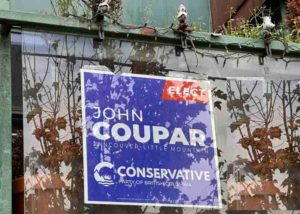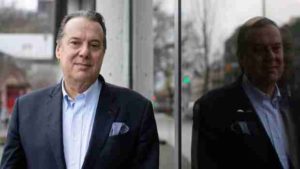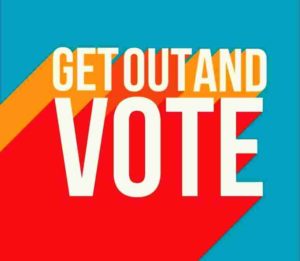
Category Archives: BC Election 2024
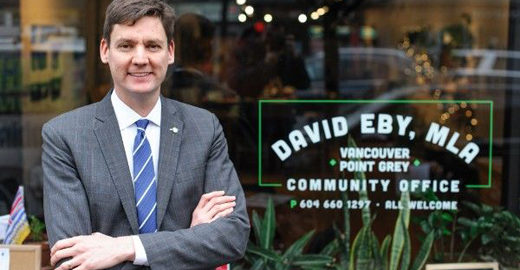
#BCPoli | A Re-Elected David Eby and a BC NDP Majority Government
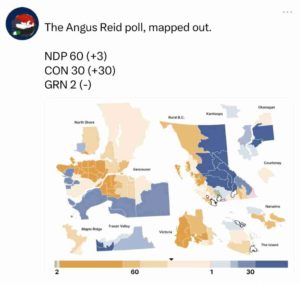 The Angus Reid Institute surveyed 2863 citizens in every riding across the province — online, on the phone and in focus groups — a statistically valid sampling of a representative group of voters in each riding / region of the province, and predicts a majority NDP government will be elected on October 19.
The Angus Reid Institute surveyed 2863 citizens in every riding across the province — online, on the phone and in focus groups — a statistically valid sampling of a representative group of voters in each riding / region of the province, and predicts a majority NDP government will be elected on October 19.
Come 9pm this upcoming Saturday night — October 19th, 2024 — incorporating an up-to-date riding by riding analysis, and a representative cross-sampling of the twenty most reliable polling companies which have weighed in and reported out on the 2024 British Columbia election, VanRamblings has come to believe the good citizens of British Columbia will elect David Eby to a full term of office, as our province’s duly-elected Premier-designate, as the British Columbia New Democratic Party is set to enjoy majority government through the autumn of 2028, with a good prospect of being re-elected to office again that year.

The Honourable Thomas R. Berger, leader of the British Columbia New Democratic Party in 1969.
For a good long while, VanRamblings believed that the BC NDP’s 2024 campaign for office bore a distinct relation to Tom Berger’s failed and far too “intellectual”, professorial and “coldly calculating” NDP campaign for office, in 1969.
VanRamblings no longer believes that to be the case.
Over the course of the past 10 days — in the post-debate period — the conditions of the 2024 BC NDP campaign have been radically reset, as a warmer David Eby has emerged on the campaign trail, no longer providing deadly boring lectur-y and utterly enervating policy pronouncements devoid of humanity.
Instead what British Columbians have seen in televised press conferences held in, for example, Courtenay-Comox, Campbell River and Surrey, is a David Eby who radiates warmth, the David Eby many of us know so well — the David Eby who consistently polled at a 53% approval rating for the past two years, as Canada’s most popular Premier — once again emerging on B.C.’s political stage, humble and comfortable in his skin — not to mention, affable and engaging — while providing the information British Columbians need to know before they cast their ballot.
VanRamblings advised B.C. NDP leader David Eby to be more aggressive on the campaign trail. David Eby, wisely, ignored VanRamblings’ advice, instead saying to himself, “Well, if I’m going to lose this campaign, I’m going to lose it being me, not as some automaton the campaign created.” David Eby has, as we expected would be the case, taken charge of his campaign for re-election over the course of the past ten days, his waggish sense of humour and his love of the province and all of its citizens front and centre in a rejuvenated and re-energized B.C. NDP campaign.

BC NDP leader Glen Clark emerges victorious and Premier-designate in 1996’s British Columbia election
Then we got to thinking, “If the correlation between the failed 1969 BC NDP campaign and the 2024 BC NDP campaign for office doesn’t hold water, what about the 1996 election, when Glen Clark became Premier, in spite of the fact that Gordon Campbell’s insurgent B.C. Liberal party garnered 43% of the popular vote to Mr. Clark’s 39% of the vote, yet due to ‘voter efficiency,’ the British Columbia New Democratic Party would form and hold government from 1996 through 2001?”
The BC NDP in 2024 have consistently polled five points ahead of the BC Conservatives. What if a situation occurred in 2024 that, although the BC NDP is polling ahead of the BC Conservatives, on a riding-by-riding basis and in the targeted riding campaign BC Conservative co-campaign manager, Dimitri Pantazopoulos has run, BC Conservatives pull ahead on the seat count on election night to form government, despite winning fewer votes than their BC NDP rival?
Nah, we concluded. Too many differences between the 1996 and 2024 campaigns.
The upstart BC Conservatives are running a seat-of-their-pants election, devoid of a GOTV (Get Out the Vote) electoral machine necessary to win government, with much less money, many more untried candidates, and in a campaign that is rife with … see below as to what we believe to be a more relevant campaign correlation that may well inform the outcome of the 2024 British Columbia election.
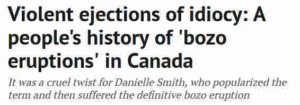
On March 26th of this year, VanRamblings published a prescient column titled, Bozo Eruptions Disrupt Election Campaign, where we tracked then Alberta Wildrose party leader Danielle Smith’s failed bid for office.
See if you don’t think that there’s a correlation between Danielle Smith’s failed 2012 campaign for office, and the BC Conservative’s calamitous 2024 campaign.
As Stuart Thompson wrote, at the time, in The National Post …
It is a surefire rule of politics that at any given moment, somewhere in Canada a bozo is about to erupt.
Just as a political campaign is looking to flip the script, or turn the corner, or recapture the narrative, some bozo will ruin it for them, prompting damage control, tearful apologies, or, in the most severe cases, a resignation.
The bozos simply can’t stop themselves from erupting.
Conservative strategist Tom Flanagan, who ran Smith’s 2012 campaign, oversaw one of the most memorable stretches of bozo eruptions in Canadian political history: Smith wanted a big tent party, and open and unvetted candidate nominations.
Two days after the 2012 election was called, a Wildrose candidate’s year-old blog post was unearthed declaring that all gays were destined for a “lake of fire”. Smith refused to rebuke her candidate, saying the party “accepts a wide range of views.” And the hits just kept on comin’ for the Wildrose campaign, as day after day after day, a new candidate bozo eruption garnered front page coverage, and the lead story status on the evening news.
Danielle Smith’s dreams of becoming the Wildrose Premier were dashed, the party 20 points behind their polling on Election Day.
Danielle Smith’s failure to rebuke a candidate. Kind of sounds like BC Conservative Party leader John Rustad, who has consistently refused to censure any racist, intolerant, misogynist and homophobic utterance by any of his candidates.

What does the above have to do with British Columbia’s October 19th election?
Everything.
From the day after the Leaders’ Debate through until today, the BC Conservative campaign has been dogged by the shocking controversy surrounding their Surrey South candidate, Brent Chapman, such that the entire focus of leader John Rustad’s campaign for office has not been on the issues he’s raised at the daily press conferences he has held over the past week. Talk about being off message.
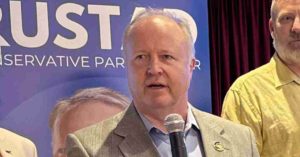
Brent Chapman, the B.C. Conservative Party’s Surrey South candidate, has said that what happened at residential schools is a “massive fraud”, called for a “boycott” of Air Canada to stop airlifts of Syrian refugees, questioned high profile mass shootings such as Sandy Hook elementary school where 20 children were murdered, while denying the white nationalist terrorist attack on a Québec City mosque.
Think of Rustad’s BC Ferries press conference, which got buried in an avalanche of questions put to the leader about whether Brent Chapman would be allowed to continue as a candidate for the BC Conservative Party in the riding of Surrey South.
The entire focus of reporter questions related to the ongoing, disastrous Brent Chapman fiasco, with no questions whatsoever on the BC Conservative plan for BC Ferries, or on subsequent days on the BC Conservative issue of the day, as the BC Conservative campaign was consistently held off message.
Can you say, devastating, calamitous, detrimental, hapless and noxious?
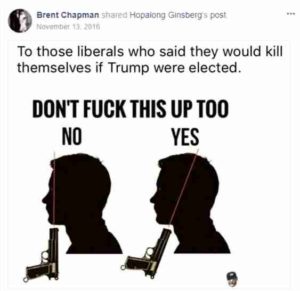
Chapman also shared a graphic posted by a far-right meme account.
The graphic features images of two handguns and the silhouettes of two heads.
“To those liberals who said they would kill themselves if Trump were elected,” the graphic states. “Don’t fuck this up too.”
The graphic suggests “liberals” should aim the gun at the centre of their brain rather than at their chin, an apparent reference to how best to commit suicide.
The most damning Chapman post — and destructive to the BC Conservative campaign — occurred surrounding the resurfacing of past statements demonizing Muslims and Palestinians, accusing them of “inbreeding.”
2. Mr. Chapman has many opinions on people of the Muslim faith. Here he refers to Muslims as, “little inbred walking, talking, breathing time bombs…” #bcpoli #vanpoli #cdnpoli pic.twitter.com/pPXC2Ze06K
— Jas Johal (@JasJohalBC) October 10, 2024
Why destructive to the BC Conservative campaign? Well, just see above.
Also, because 43% of the voters in the Surrey-Cloverdale riding where former BC United MLA, Elenore Sturko, who joined the BC Conservatives in June — who, only two weeks ago was polling at 56% in the riding, as Brent Chapman’s extremist anti-Muslim rants came to light has seen her potential to win the riding evaporate, as NDP incumbent Mike Starchuk, with the full support of the 43% Muslim electorate, is now set to win the riding Saturday night, and re-election to the BC Legislature.

Keith Baldrey, veteran Global BC Legislative reporter
On Mike Smyth’s CKNW talk show, Global BC reporter Keith Baldrey stated that Elenore Sturko was fully aware of Brent Chapman’s extreme views before she decided to run alongside him, as Ms. Sturko described Chapman as “an extremist” and a “QAnon conspiracy theorist” shortly before she defected.
“A week before Sturko made her jump, her announcement that she’s going to join the BC Conservatives, I ran into her in the Legislature library. And in my Facebook feed was suddenly a video from Brent Chapman and it was sort of about his candidacy. And I didn’t know him, I didn’t know he was married to (federal Conservative MP) Kerry-Lynne Findlay … I said to Sturko, “Oh, so you’re running against an actor?” And she says, “Oh, this guy, he’s a…” and she called him “an extremist,” said he was a ‘QAnon conspiracy theorist, that he’s crazy, you know.’ And at that point, she was still a member of BC United.” (CKNW, Oct 10)
All of the unsettling and disturbing news that has emanated from the BC Conservative campaign, following a dreadful — what CHEK-TV reporter Rob Shaw called a cadaver-like — Leaders’ Debate performance by John Rustad, giving the “win” to David Eby at 48%, with only 32% support for John Rustad, has caused the BC Conservative campaign not only to stall, as the party continues to lose momentum and more and more voter support with each passing day, but to recede, or perhaps even collapse, making a BC Conservative win on Saturday, at best unlikely.
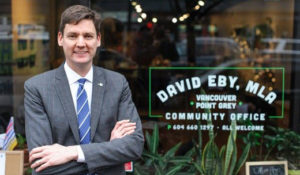
As occurred in 2012 during that year’s Alberta election, come Election Day when Danielle Smith’s Wildrose Party lost 16 percentage points in support due to the day after day, drip by drip revelations of racism, intolerance and the hate espoused by many of her candidates, VanRamblings believes, come Saturday, when the vast majority of British Columbians will cast their ballot at the polls, British Columbians of conscience will make the decision to cast their ballot for the principled candidate for Premier, David Eby, and a British Columbia New Democratic Party where you have heard nary a whisper of intolerance, because as British Columbians we realize when we enter our local polling station, the only reasonable political party to vote for to form government will be the British Columbia New Democratic Party.
You’ll want to watch / listen to what former BC NDP Premier Glen Clark has to say about the 2024 British Columbia provincial election. If you don’t see the Hotel Pacifico podcast YouTube video above, you can listen to it here or here or here.
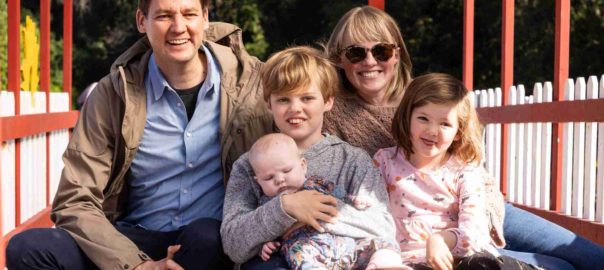
#BCPoli | VanRamblings Endorses David Eby and a Majority NDP Government

David Eby and his family, baby Gwen, son Ezra, 10, daughter Iva, 5, and David’s wife, Dr. Cailey Lynch
David Eby stands out as a visionary, a once in a generation political leader who is committed to justice, equity, and the well-being of all British Columbians.
As the Premier of British Columbia, David Eby has demonstrated his exceptional skills as a politician, and his unwavering dedication to meaningful social change.

David Eby’s leadership embodies a rare combination of compassion, authenticity, a deep understanding of how government functions and how best to bring about change for the better that serves the interests of all B.C. citizens — young people just starting their lives, vulnerable populations in every community, middle class and those working to join the middle class working people setting a path to establish themselves in the economy, those British Columbians who have already established themselves as the core element of British Columbia’s population that are thriving in our robust economy, members of our mature population and senior citizens in retirement or just about to embark on retirement — and all ethnic and cultural groups who comprise the mosaic of British Columbia’s diverse population.
David Eby’s bold policy vision seeks to address the province’s most pressing issues — health care, the provision of housing to serve the interests of all British Columbians no matter their economic circumstance, crime and public safety — with a well-thought-out action plan to ensure his government’s success.
- Health care. David Eby has successfully worked with a sometimes intransigent and hide bound federal government to streamline the process to allow doctors and nurses to enter Canada, become accredited and begin their practice in British Columbia. In 2023, David Eby’s government hired 700 new doctors and 1500 new nurses, and will do so again this year and next year — for a total of 2100 new doctors and 4500 new nurses arriving from abroad over a three year period into British Columbia, unprecedented any where else in Canada, many of Canada’s new physicians and nurses arriving from Great Britain, these health care professionals leaving a British health care system in crisis after 15 years of Conservative government. In addition, British Columbia graduates 1500 new registered nurses and 300 new doctors from British Columbia post secondary institutions each year, a figure set to expand;

- Housing for all. 100,000 new housing co-operative units to be built across the province over the next 10 years, on Crown land, on a 99-year leasehold basis, collective home ownership for 250,000 British Columbians; 25,000 units of supportive housing to be constructed and open by 2030 to house British Columbia’s unhoused and most vulnerable citizens, too many of them currently living in rundown, rat-infested SROs; 25,000 new homes for those getting into the market, 40% of the cost of the new homes borne by government on a 25-year cost recovery basis; the B.C. Builds programme, which will see the construction of 100,000 units of market housing, many of those transit-oriented new homes in Metro Vancouver built around Skytrain stations; and 50,000 units of housing as homes for our burgeoning seniors population;
- British Columbia Attorney General Niki Sharma and Premier David Eby have over the past two years embarked on a mission to ensure the revolving door system of justice — or injustice, as most British Columbians see it — comes to an end, so that prolific offenders are jailed and off the streets for an indefinite period of time. In addition, Premier David Eby has committed to a system of involuntary care for those addicted, mentally unwell members of our community involved in crime, assault and mayhem as a lifestyle choice, who pose a danger to themselves and others, who will receive treatment to allow them to become functioning members of our community.
The entire British Columbia New Democratic Party platform may be found by clicking or tapping on this link, and includes information on the B.C. NDP’s proposed transportation policy — which involves full government funding of public transportation, as a priority — expanding school meal programmes; strengthening consumer protection laws; cracking down on housing speculators and flippers; protecting you from the return of MSP premiums and bridge tolls; keeping rent caps in place for B.C.’s residents living in one of British Columbia’s 600,000 rental units; training more doctors; making B.C. a clean-energy superpower; reducing carbon pollution; moving B.C. closer to our goal of protecting 30% of provincial lands by 2030; and working with Indigenous peoples to strengthen communities, by taking action on Indigenous housing, education and supports for families and people.
The Future: A Choice for Progress or Regression
As British Columbia heads towards Election Day 2024 — this upcoming Saturday, October 19th — the stakes are high.
David Eby’s B.C. NDP is the only British Columbia political party offering a comprehensive, inclusive vision for our province’s future.

In contrast, the far-right BC Conservative Party, known for its climate change denial and socially regressive policies, not to mention racism and intolerance, threatens to undo much of the progress made under David Eby’s leadership — for instance, the 250,000 British Columbians who might look forward to a residence within one of the 100,000 units of co-op housing David Eby’s government will build, can forget about that as a future prospect, given John Rustad’s regressive Conservatives have no plan to provide any such housing, which they consider to be a radical communist conspiracy, one of the many conspiracies which inform their raison d’être.
The B.C. Conservative Party’s rejection of diversity, inclusivity, and climate science stands in stark contrast to David Eby and the B.C. New Democrats’ commitment to addressing real-world problems with innovative and compassionate solutions.

The October 13th Angus Reid poll of 2863 eligible B.C. voters. Want to make it happen? Vote NDP!
For British Columbians, the choice is clear: a vote for David Eby and the British Columbia New Democratic Party is a vote for progress, stability, and the continuation of policies that uplift all citizens, particularly the vulnerable and marginalized.
David Eby’s leadership represents a rare opportunity for the citizens of British Columbia — a chance to build a fairer, more equitable society while tackling the housing, health care, and climate challenges that will define our province’s future.


#BCPoli | VanRamblings Formally Endorses B.C. Conservative John Coupar in the Riding of Vancouver-Little Mountain

Today, VanRamblings formally endorses B.C. Conservative candidate John Coupar in the riding of Vancouver-Little Mountain.
We know John Coupar to be a man of calm and reason, an accomplished businessman, a successful past Chairperson of the Vancouver Board of Parks and Recreation, and a man of character and integrity who would well represent the constituents within the riding he has long called home, and where he is well-acquainted with and knows the issues of concern to his neighbours, issues he would set about to remedy should he be elected to office this upcoming Saturday, as the Member of the Legislature representing Vancouver-Little Mountain.
John Coupar — a Red Tory in the mould of federal Conservatives like Joe Clark, Robert Stanfield, Erin O’Toole and Michael Chong — was the first potential B.C. Conservative Party candidate the nascent party’s leader, John Rustad, approached back in March to run with the newly insurgent British Columbia political party.
Although Mr. Coupar was offered the opportunity to run in the, perhaps, more winnable riding of Vancouver-Yaletown, he chose to run as the B.C. Conservative candidate in the riding of Vancouver-Little Mountain, as we say above, a neighbourhood he has long called home. It should be noted in passing that John’s NDP opponent Christine Boyle does not live within the boundaries of the riding; rather, Ms. Boyle calls the east side neighbourhood of Grandview-Woodlands home.
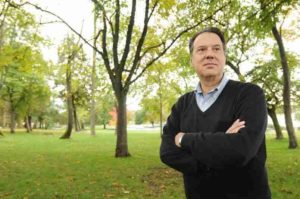
VanRamblings knows John Coupar to be a steady and progressive voice of reason and compassion, a democrat of the first order, and a defender of the public good.
We believe that it is critical John Coupar be elected this upcoming Saturday.
John Coupar would most assuredly be a calm and steady voice of reason within the B.C. Conservative caucus — someone his colleagues would turn to for direction when division arises — and should the Conservative Party of B.C. be elected to government on Saturday, October 19 — certainly not outside the realm of possibility, based on the latest polls — a steady voice of reason around the Cabinet table.
One of the issues B.C. Conservative Party leader John Rustad has raised as a party platform in recent days is the commitment to eliminate the SOGI 123 programme that protects LBGTQ+ and gender variant children, a programme a recently published UBC longitudinal study found reduced discrimination, while creating a more welcoming & inclusive educational environment for students across the province.
UBC professor Dr. Elizabeth Saewyc, Executive Director of the Resilience Among Vulnerable Youth Centre at UBC’s School of Nursing, told CTV Vancouver …
“The longer SOGI 123 was in schools, we saw reductions in things like verbal harassment and social exclusion, physical assault in schools, as well as sexual orientation discrimination or discrimination because people thought you were gay, lesbian or bisexual,” she told CTV Vancouver. “Declining rates of discrimination weren’t only felt among 2SLGBTQ youth. That impact was felt by all students across the entire school, affecting the largest group in the school, of course, which would be heterosexual students.”
Should the Conservative Party of B.C. be elected to government this upcoming Saturday, as the newly-elected government looks to adopt an anti-bullying policy that would apply to all students, make no mistake, as a British Columbian, you want John Coupar’s voice to be heard as a member of the Committee of Cabinet — perhaps, along with Surrey-Cloverdale candidate, Elenore Sturko, Kelowna-Mission candidate Gavin Dew and North Island candidate, Dr. Anna Quindy, should they be elected — that would be struck to develop a new, reformed anti-bullying policy.

In April 2015, when a gender-variant policy, a year in the making, was presented to the elected Vancouver Park Board Commissioners, the most moving address to those gathered in a crowded Park Board conference meeting room was given by John Coupar, who thanked all of those who had presented to Park Board on an issue of importance to each person in attendance, as well as to him, saying …
“Sitting on Park Board for the past almost three years has proven to be the most enlightening and moving experience of my life, and never more so than was the case this evening. I want you to know that you have an advocate in me, and in my fellow Park Board Commissioner, Melissa De Genova, that we will fight for you, we will fight for inclusivity in our parks and in our community centres.
Working together with all of the Commissioners, I commit to you that our parks and community centres will become welcoming and safe havens for you, where you will be respected always.
I look forward to working together with you, and with Park Board staff, on the early implementation of all facets of the gender-variant policy on which you have worked so hard, and has proved of such service to our community. Should I be elected to Park Board for a second term this November, and become the Chairperson, I commit to ensuring the implementation of what you have asked for: gender neutral washrooms, carrels in changing rooms, and an exclusive and safe gender variant swim on Sunday mornings at Lord Byng and Templeton pools.
Throughout my life, I have made a commitment to inclusivity, fairness and equity — let us work together, go forward and write a new chapter in our social and political history in our city and at Park Board, as we work towards a community of comfort, respect and acceptance that serves the interests of all of our citizens.”
Make no mistake, John Coupar is tough and strong-minded, and — take our word for it — does not suffer fools gladly.
The B.C. Conservative Party, if they don’t know it to be the case already, will learn that John Coupar is also the quintessential team player, whose only ambition is to do well for the citizens of British Columbia. Whether in caucus, or in Cabinet, B.C. Conservative Party leader John Rustad will come to learn, if he doesn’t know it already, that John Coupar will always have his back, and over time will become a trusted and loyal lieutenant within an almost certain to be fractious caucus.
Over the course of the past fourteen years, VanRamblings has come to know John Coupar very well, as a man of uncommon intelligence and compassion, articulate, achingly bright and principled, whose love for and knowledge of British Columbia is unparalleled among any of our acquaintances.
Married to the love of his life, Heather, for the best part of his life, John Coupar — a native of Vancouver, who loves our city as he does our province — raised his 2 children in Vancouver. As his children grew and left the family nest, John and Heather downsized, about 15 years ago, moving into the Village on False Creek, considered by many to be one of the greenest and most livable communities on the continent.
